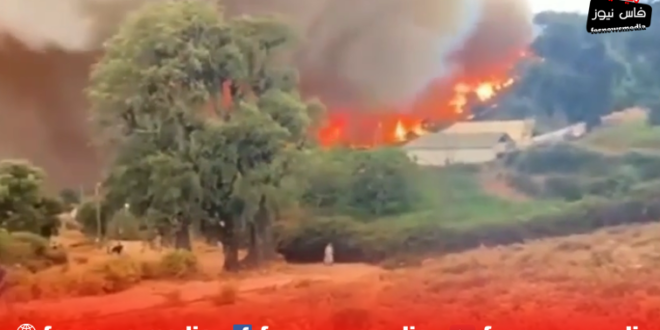Wildfires, one of the most common disasters affecting the environment and humanity, have doubled worldwide over the past 20 years due to rising temperatures as a result of human activity, according to a new study published on Monday.
The researchers used satellite data to study about 3,000 forest fires with massive “radiative power” – the amount of energy emitted by radiation – from 2003 to 2023, and found that the frequency of these fires increased by 2.2 times during this period.
The study showed that temperate coniferous forests, especially in the western United States, and boreal regions extending from Alaska, northern Canada and Russia, are the most affected by the increased fires, with the frequency of these fires increasing by up to 11 and 7 times, respectively.
Regarding the most deadly fires, the study showed that the cumulative radiation power of these fires has more than doubled, at a seemingly accelerating pace, according to the research published in Nature Ecology and Evolution.
The study’s lead researcher, Callum Cunningham of the University of Tasmania in Australia, expressed concern over the high rate of increase: “I was expecting an increase in those numbers, but the actual rate of increase worried me.”
Cunningham added in an interview with AFP: “The effects of climate change are becoming evident in our daily lives, and we are witnessing increasingly dry and warm weather events, which calls for the need to strengthen forest conservation strategies.”
The study also revealed that the last six years have seen the highest severity and frequency of wildfires since 2017, reinforcing the general trend of worsening wildfires. For example, 2023 saw the worst wildfires during the studied period.
Severe fires are exacerbated by the increasing drought caused by rising temperatures. Vegetation absorbs carbon dioxide as it grows and releases it back into the atmosphere when it catches fire, increasing greenhouse gas emissions and contributing to devastating temperature rises.
Cunningham concluded by emphasizing that this phenomenon results in “rebound effects,” pointing to its multiple negative impacts including air pollution due to widespread smoke clouds, which negatively affects health and leads to an increase in premature deaths, as previous studies have pointed out the impact of air pollution caused by large fires in 2015 in Indonesia that resulted in the death of nearly 100,000 people.
The new study shows that forest fires represent an increasingly serious global environmental and health challenge, calling for an immediate international response to minimize the effects of climate change on vegetation and the global environment in general.
Source: Fez News Media
 فاس نيوز ميديا جريدة الكترونية جهوية تعنى بشؤون و أخبار جهة فاس مكناس – متجددة على مدار الساعة
فاس نيوز ميديا جريدة الكترونية جهوية تعنى بشؤون و أخبار جهة فاس مكناس – متجددة على مدار الساعة













